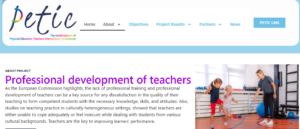PETIC is a comprehensive project aimed to equip Physical Education (PE) teachers of primary and secondary education with the appropriate knowledge and skills for raising their own and pupils’ intercultural competence levels.

Social inclusion has always been a consideration in Europe, which is grounded on the European vision of democracy within a pluralistic society composed of people of different linguistic and cultural backgrounds. According to UNESCO “the costs of intercultural incompetence are so high, including all the dangers of conflict and war . . . just as our future depends upon our ability to gain and demonstrate intercultural competence today”.
It seems that the development of intercultural skills, today, is more essential than ever in order to avoid conflict and the marginalization of citizens on the basis of their cultural identity. In this direction, education and lifelong training should play an active role. Insufficient school capacity in terms of limited resources, lack of relevant education materials, and staff equipped to cope with students’ diverse needs and to promote openness to diversity, are some of the barriers that influence students’ academic performance and well-being and are in need to be overcome.
As the European Commission highlights, the lack of professional training and professional development of teachers can be a key source for any dissatisfaction in the quality of their teaching to form competent students with the necessary knowledge, skills, and attitudes. Also, studies on teaching practice in culturally heterogeneous settings, showed that teachers are either unable to cope adequately, or feel insecure while dealing with students from various cultural backgrounds.
Teachers are the key to improving learners’ performance and thus, a continuous upgrade of competencies they need for life should be made while being in constant contact with research for teaching innovations and incorporating new research findings in their teaching practices.
Finally, teachers are the key factors in implementing new curricula effectively. While technology has become a superior vehicle for transmitting knowledge, digital skills should be scaled up while the relational aspects of teaching – being a good mentor – should remain as human capacities of enduring value. Pupils are, also, play an important role in the effort of teachers for activating innovative teaching and inclusion methods, and the improvement the quality of teaching. Pupils’ active participation and engagement with the learning process, co-creation, and collaboration, are essential elements that the curricula should encourage and teachers should reinforce.